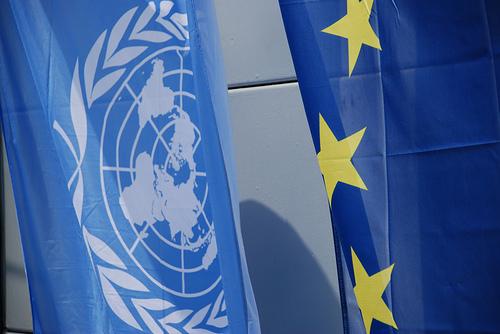EU Attempts to Shut Down UN’s Effort to Make Trans-National Corporations Accountable

Image Courtesy: Egmont Institute
An international group blamed that the European Union (EU) is currently lobbying to eliminate the funding for a United Nations’(UN) body that was mandated with drafting legally binding instruments to hold TNCs accountable for their human right violations across the globe.
According to the Global Campaign to Reclaim People’s Sovereignty, an international group fighting against the human right violations by Trans-National Corporations (TNCs), the Inter-Governmental Working Group (IGWG) of the UN Human Rights Council has been tasked with this mandate.
The funding for IGWG is decided by United Nations General Assembly’s fifth committee. A delegation from the EU is putting in pressure on the fifth committee to eliminate funding for the IGWG – in a move clearly meant to protect the interests of the international monopoly capital.
This is not the first time the European Union is trying to sabotage the framing of these laws. Since the institution of this mechanism in 2014, the EU had been trying to derail the process continuously.
The need for an international law to deal with TNCs and Human rights
TNCs all over the world have been responsible for serious human rights violations, without any repercussion for themselves. There are numerous international legal institutions protecting the interests of the TNCs – in the form of trade agreements, investor dispute settlement mechanisms, arbitration councils, where the TNCs can drag the countries when their profits are threatened. But till now there has been no international mechanism to bring these corporations to book on their exploitative practices which often amount to serious human rights violations.
One such example is the case of Union Carbide Corporation (UCC) and its responsibility in the 1984 Bhopal Gas Industrial Disaster in India - where thousands died, and lakhs of people were exposed to toxic gases resulting in serious and long-term health problems. More than three decades after the incident, those toxins still pollute the groundwater of the regions, and yet UCC got away with a ‘rap on the knuckles’ in the form of meagre compensation to the victims of the disaster. Till today the plant site is contained and has not been cleaned by the company.
Similarly, a recent report by Amnesty International documents the large-scale human rights abuses by the Royal Dutch Shell in Nigeria in the 1990s. According to Amnesty International, the Anglo-Dutch corporation bankrolled and is complicit in the attacks, torture and killings of thousands of Nigerians who opposed the contamination of Niger Delta by the corporation’s extraction activities. Shell has not been held accountable for its crimes till now and the victims never got justice.
These are just two of the many human rights violations committed by the TNCs that happen regularly across the world, in the form of exploitative wages, child labour, plunder of common natural resources, air and groundwater pollution, deforestation and political manipulation.
While dictators, politicians and military generals are held accountable under international laws (including International Criminal Court) for their crimes against humanity; the corporations have complete immunity and exemption from this. This is due to the pressure from the United States and other developed countries at the times of the formation of the International Criminal Court.
At present, the international instruments only make adherence to human rights regulations by the global corporations voluntary, with no external mechanism to regulate them.
The IGWG of the UN human rights council was specifically formed to address this problem. As per its mandate, the IGWG has already started negotiations for a treaty in the month of October, this year and set to finalise a draft treaty by 2018.
The EU’s attempts to cut off funding for this process indicates whose vested interests it serves – those of the corporations and monopolies.
Get the latest reports & analysis with people's perspective on Protests, movements & deep analytical videos, discussions of the current affairs in your Telegram app. Subscribe to NewsClick's Telegram channel & get Real-Time updates on stories, as they get published on our website.
























